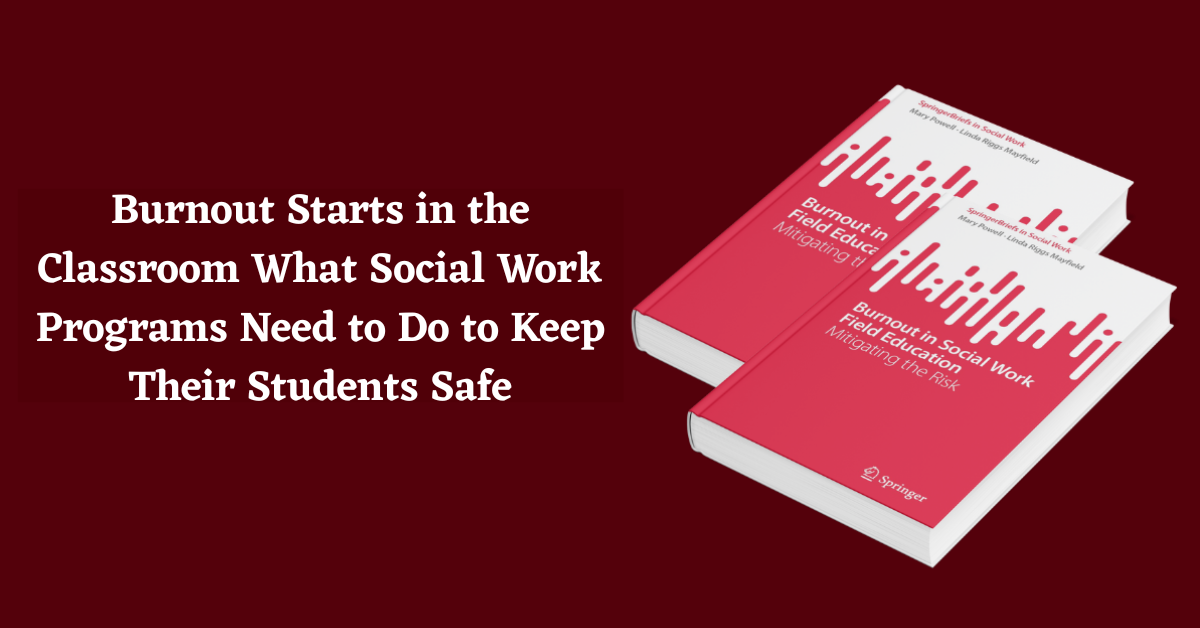Burnout is not only a problem for experienced professionals. It frequently starts many years earlier, even before the first job is undertaken by a social worker. Dr. Mary Powell, in Burnout in Social Work Field Education: Mitigating the Risk, explains how the seeds of emotional exhaustion are sown at one of the most critical phases of professional development: the field placement of the student.
Social work programs have for decades addressed burnout as an individual deficiency something that students can avoid if they simply try harder, take care of themselves, or “learn to cope.” But Dr. Powell’s research shows something much truer: burnout more frequently results from systemic issues rather than personal frailties. And if institutions are to create healthy, capable social workers, they must be accountable for the cultures they cultivate.
The Gap between Curriculum and Reality
Social work education rests on a twofold foundation: classroom instruction and field practice. Yet the latter is commonly described as the profession’s “signature pedagogy” a critical environment in which theory and practice intersect. But in reality, there’s too great a gap between what students learn in class and what they face in the field.
In her research with more than 200 MSW students, Dr. Powell found that students go into fieldwork with ideals but few expectations about their role. They’re exposed to emotionally demanding work, frequently without the kind of supervision or support required to contain it. The result is a kind of disorientation that not only interferes with learning but speeds burnout.
This experience, role ambiguity, is prevalent throughout the book. Students do not know what is expected of them, to what extent they have autonomy, or even how to request assistance. Without a firm structure in place, many think that they are “failing” before they are able to start.
The Institutional Role in Burnout Prevention
It’s time to change the script. Burnout isn’t just an individual problem it’s an institutional problem. Dr. Powell contends that social work schools need to own up to their influence in creating student experiences and take tangible action to mitigate risk.
That means:
- Field supervisors trained to provide clear direction and emotional support
- Formalized check-ins between faculty liaisons and students
- Infusing burnout sensitivity into the academic curriculum
- Providing students with permission to reflect, process, and establish boundaries
In short, institutions need to take student wellbeing as seriously as academic success.
And beyond this, Dr. Powell pushes educators to move beyond general encouragement of “self-care” and instead integrate coping structures into course design. Students ought to graduate not only with the knowledge of how to evaluate others’ mental health, but with the ability to take care of their own.
The Pandemic and Beyond
The pandemic of COVID-19 added to an already shaky system. Field placement was interrupted, social work was conducted online, and numerous students were forced to cope with crises with even fewer resources than before. Dr. Powell’s book, penned after these developments, identifies this shift and utilizes it to call for change.
She points out that although some institutions stepped up to the challenge, many students expressed being alone and overwhelmed. The pandemic exposed existing vulnerabilities in the system and identified the need for institutional reform with a heightened sense of urgency.
A Vision for the Future
What would a healthier, sustainable model be? Dr. Powell says it starts with seeing students as whole persons not merely future professionals. Her book promotes a three-level approach to preventing burnout and emphasizes:
- Student self-awareness and the development of coping strategies
- The structure clarity and accountability of the educational institution
- The host agency’s emphasis on supportive supervision and inclusion
When these individuals collaborate, students are not only more effective but also more likely to persist in the profession long-term, bringing their full potential for empathy and moral practice to the task.
A Wake-Up Call for Educators
Dr. Powell’s message is unequivocal: burnout is not necessary, and it need not be the student’s to bear. If we ask students to bear the weight of the profession’s values compassion, justice, service we must construct educational environments that uphold those same values.
Burnout in Social Work Field Education: Mitigating the Risk is not just a book it’s a wake-up call. It challenges educators, administrators, and agency leaders to examine how they approach their work with students, and to construct systems that value both learning and well-being.
The future of social work isn’t merely contingent on what we educate but on how we tend to those we are educating.






